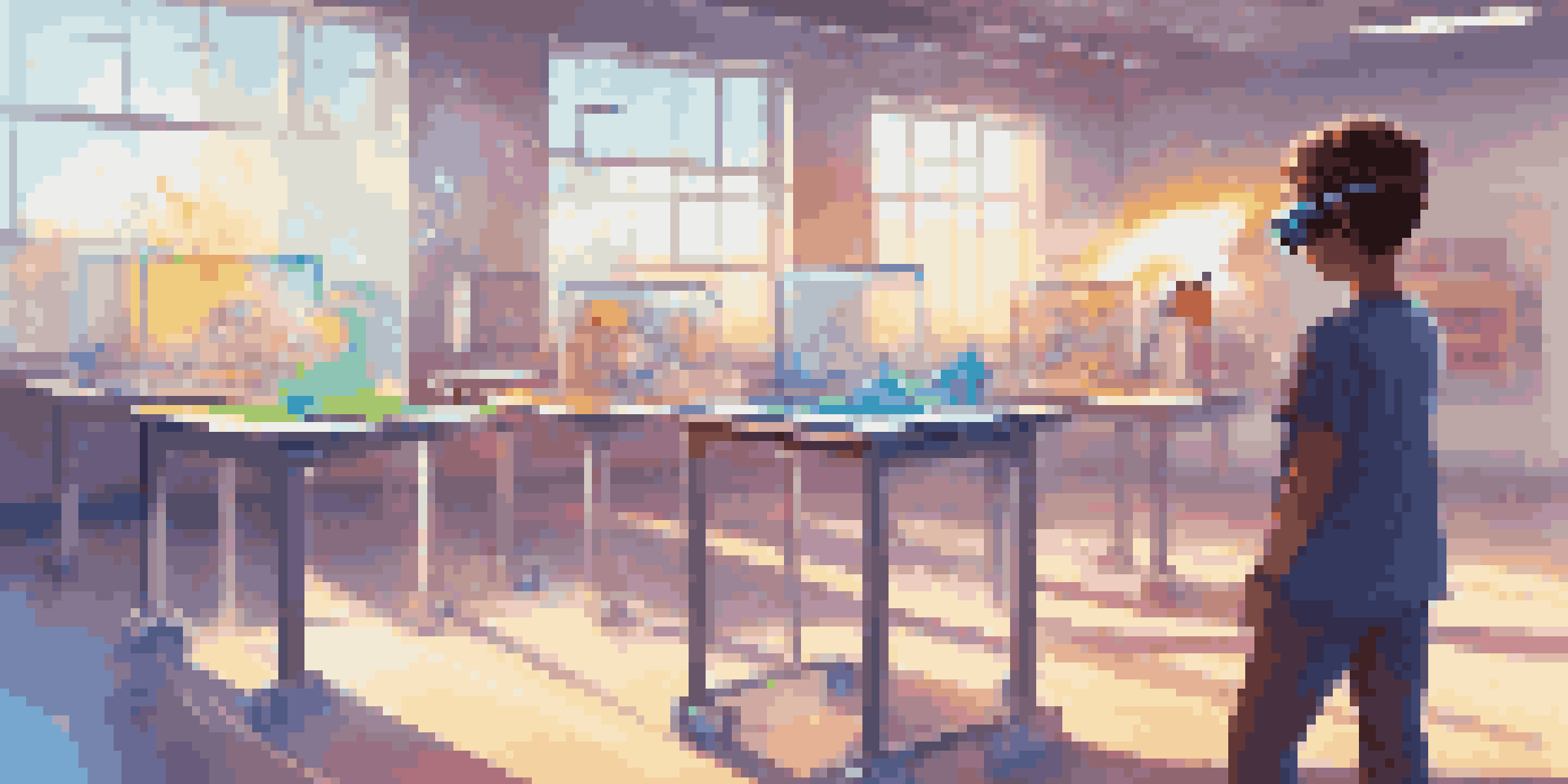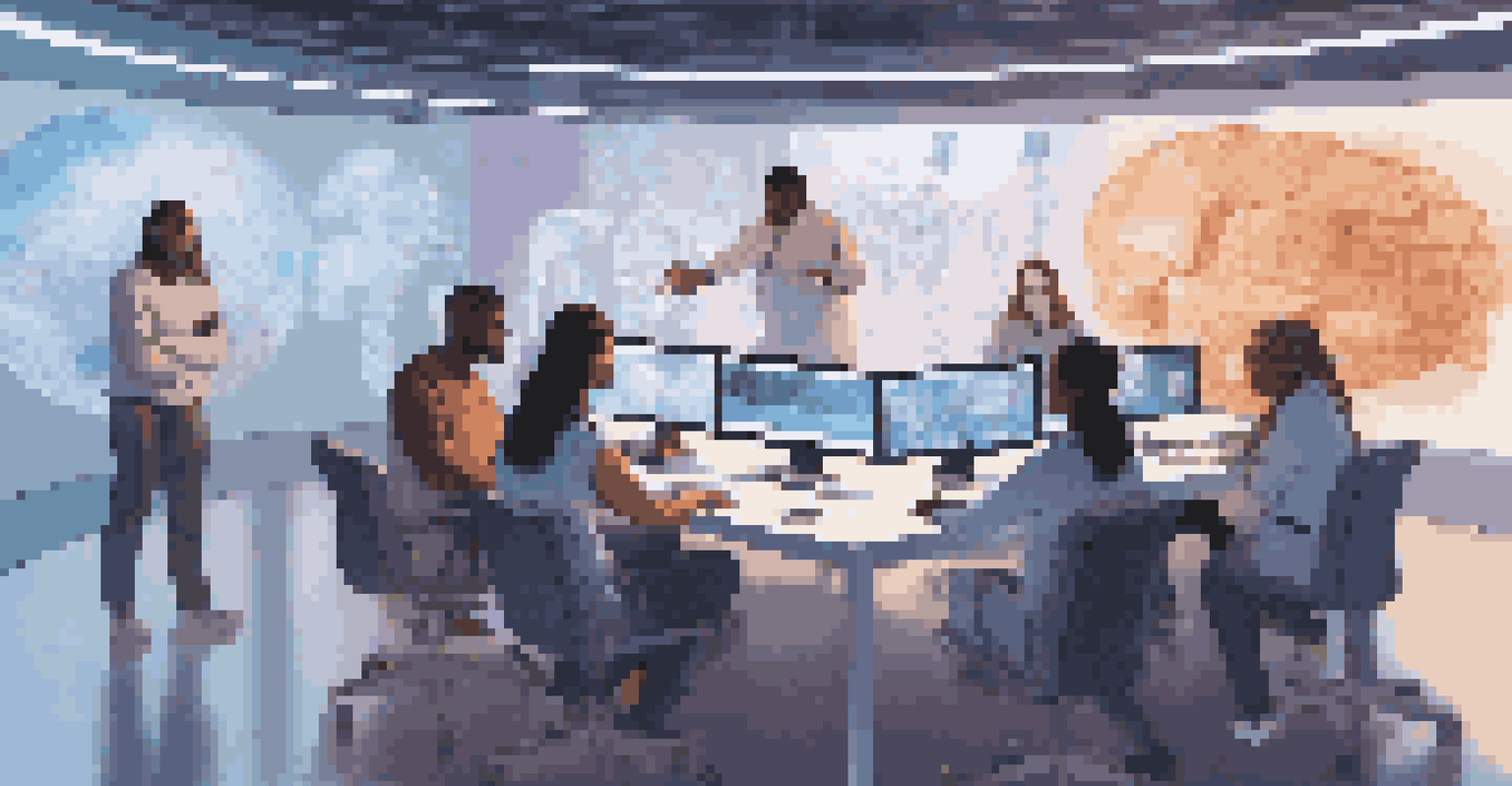Augmented Reality in Career Exploration: Engaging Students

What is Augmented Reality and Why it Matters
Augmented Reality (AR) merges digital information with the real world, creating interactive experiences. Think of it as a digital layer that enhances our perception of reality, much like a pair of smart glasses that add useful data to your view. This technology is crucial in career exploration because it makes learning about various professions more engaging and immersive.
Augmented Reality is a technology that has the potential to transform how we learn and explore careers, making education more interactive and engaging.
Imagine walking through a virtual laboratory, where you can interact with equipment and simulations that engineers use daily. Students can explore different job environments without leaving their classrooms, making the exploration process both exciting and informative. Understanding this technology's potential helps students visualize careers that might have seemed out of reach.
In a world where career options are vast and sometimes overwhelming, AR serves as a guiding tool. By providing an interactive way to investigate different fields, students can make more informed decisions about their futures. This technology empowers them to dream big while grounding their aspirations in reality.
How AR Brings Careers to Life
AR transforms the traditional career exploration approach by providing hands-on experiences. For instance, students can use AR apps to step into a day in the life of a doctor or an architect, experiencing tasks and challenges faced in those roles. This immersive experience can spark interest in fields that students may not have considered otherwise.

By interacting with virtual environments, students develop a clearer understanding of what certain careers entail. This is especially beneficial for visual learners who thrive on seeing concepts in action. It's like trying on different hats to see which one fits best, making the exploration process not just informative but also enjoyable.
AR Enhances Career Exploration
Augmented Reality makes learning about various professions engaging by allowing students to interact with virtual job environments.
Moreover, AR can bridge the gap between classroom learning and real-world applications. When students can visualize and interact with career scenarios, they gain practical insight that textbooks alone cannot provide. This connection enriches their educational journey and helps them envision their future paths.
The Role of AR in Skill Development
Engaging with AR technology also aids in developing essential skills for the workforce. As students navigate virtual simulations, they enhance their problem-solving, critical thinking, and decision-making abilities. These are not just academic skills; they are crucial in nearly every profession.
The future belongs to those who believe in the beauty of their dreams and the tools to visualize them.
For example, a student interested in mechanics could virtually disassemble and reassemble an engine using AR. This hands-on practice builds confidence and competence, equipping them with skills that employers value. Experiencing real-life scenarios prepares students for the complexities of their chosen fields.
Additionally, AR fosters collaboration, as students can work together in virtual environments. This teamwork mirrors real-world job settings, where collaboration is often key to success. By practicing these skills in an AR setting, students are better prepared for the dynamics of the workplace.
Personalized Learning Experiences with AR
One of the most significant advantages of AR in career exploration is its ability to offer personalized learning experiences. Each student has unique interests and learning paces, and AR can tailor experiences to fit those needs. This personalization increases engagement and retention of information.
For instance, a student interested in environmental science could explore virtual ecosystems, learning about conservation efforts at their own pace. They can dive deeper into topics that resonate with them, making the learning experience more meaningful. This individualized approach helps students build a genuine connection with potential career paths.
Personalized Learning with AR
AR offers tailored experiences that cater to individual interests and learning paces, enhancing student engagement and retention.
Moreover, personalized AR experiences help students identify their strengths and weaknesses. By recognizing what excites them or where they struggle, they can make more informed choices about their future careers. This self-awareness is invaluable as they navigate their educational and professional journeys.
AR as a Tool for Career Counseling
Career counseling has traditionally relied on assessments and discussions, but AR adds a dynamic layer to this process. Counselors can use AR to provide students with interactive career previews, allowing them to visualize their options. This can make the counseling sessions more engaging and productive.
Imagine a counselor guiding a student through an AR application that showcases various career paths based on their interests. The student can explore different jobs in a hands-on way, gaining insights that may not have surfaced in a standard counseling session. This interactive approach opens up new avenues for exploration and discussion.
Additionally, AR can help counselors track student interest and engagement over time. By analyzing how students interact with different career simulations, counselors can tailor their guidance. This data-driven approach enhances the counseling process, ensuring it meets the evolving needs of students.
Challenges of Implementing AR in Education
Despite its benefits, implementing AR in education comes with challenges. One significant hurdle is access to technology; not all schools can afford the necessary AR tools and software. This disparity can create gaps in opportunities for students, hindering the effectiveness of AR in career exploration.
Moreover, educators may need training to effectively integrate AR into their curricula. Without proper guidance, the technology can be underutilized or misapplied, limiting its impact. Schools must prioritize professional development to ensure teachers can leverage AR to its full potential.
Challenges in AR Implementation
Despite its advantages, implementing AR in education faces hurdles like access to technology and the need for teacher training.
Lastly, there’s the challenge of keeping content relevant and updated. The job market evolves rapidly, and AR experiences must reflect these changes to remain useful. Continuous collaboration between educators and industry professionals is essential to ensure that the AR content stays fresh and aligned with current job demands.
The Future of AR in Career Exploration
Looking ahead, the future of AR in career exploration is promising. As technology continues to advance, AR will become more accessible and user-friendly. This evolution opens the door for broader implementation across schools and educational institutions, enriching the career exploration process for all students.
Furthermore, the integration of AR with other technologies, like virtual reality (VR) and artificial intelligence (AI), could create even more immersive experiences. Imagine students not only visualizing a career but also interacting with AI mentors that guide them through their exploration. This synergy could revolutionize how students approach their futures.

Ultimately, as AR technology matures, it will play an increasingly vital role in shaping students' career paths. By offering interactive, personalized, and engaging experiences, AR can inspire the next generation to pursue their passions and succeed in their chosen fields. The possibilities are limitless, and the journey is just beginning.